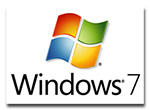 Netbooks, Sub-notebooks, ultraportables, whatever you want to call them, Microsoft is trying to figure out how to maximize their revenue from potential Windows 7 sales, without causing the manufacturers to go with an alternative. This is an issue that Microsoft has been looking at for a while now, going back to last november and beyond. Microsft has already had to relax some hardware restrictions on initial limitations they imposed with Windows XP Home licensing, as well as extending sales of Windows XP Home in general.
Netbooks, Sub-notebooks, ultraportables, whatever you want to call them, Microsoft is trying to figure out how to maximize their revenue from potential Windows 7 sales, without causing the manufacturers to go with an alternative. This is an issue that Microsoft has been looking at for a while now, going back to last november and beyond. Microsft has already had to relax some hardware restrictions on initial limitations they imposed with Windows XP Home licensing, as well as extending sales of Windows XP Home in general.
Given the low price and rapid growth in the market of these devices, Microsoft faces the situation of trying to get people to buy the more expensive versions of Windows 7. Having to offer Windows XP Home on literally millions of machines last year ate into Microsoft’s revenue stream – they would have preferred people buy the more expensive Windows Vista, however Vista did not perform well on many of the machines, plus the pricing was unattractive.
Last week, Bloomberg.com published an article concerning how Microsoft sees the situation and what they plan on doing both from a technical and from a financial point of view:
“The challenge for us clearly is to get the average selling price up,†Microsoft Chief Financial Officer Chris Liddell said last week. “We see Windows 7 at as an opportunity. We’ll have the ability for people to trade up, which would give us a price more similar to what we would normally get for a consumer.â€
To push customers to pricier versions of Windows 7, Microsoft is limiting the features of the cheaper edition. The most basic, called Starter Edition, can only run three programs at a time.
Microsoft will make it easy for consumers to quickly upgrade to more advanced versions, as all the required software will already be installed on the machine and it just takes a few minutes to switch from one version to the next, said Parri Munsell, a director at Microsoft’s Windows business.
“If you look at Starter Edition, I really don’t think Microsoft wants to sell that at all — it’s pretty crippled,†said Michael Silver, an analyst at Stamford, Connecticut-based Gartner Inc. “It’s really there just so they can say they have a really low-priced offering.â€
If the pricing is too high, they also face the situation of Linux potentially gaining ground – the next major release of Ubuntu has some major enhancements for netbook performance, and Hewlett-Packard and others are offering custom interfaces for Linux (this review of the Mini 1000 discusses it). These devices are actually one area where Linux can do a lot better than other markets, given that the main uses have capable equivalents on both Linux and Windows platforms (Skype, web browsing, etc.).
Read: Bloomberg.com
Thanks to Tony
